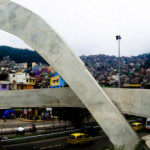Kamran Khan – The Walled Slums : Through The Looking Glass Into Peshawar’s Belly
tribune.com.pk. May ,2014. Peshawar: It is said behind every beautiful face is a story. The same is true for the provincial capital or, as it was known in the halcyon days, the city of flowers.
Peshawar, which was once known for its clean air, greenery and quiet roads, has now turned into another disfigured urban sprawl.
As the semi-organic expansion continues, one really has to struggle to find glimpses of the old city. Some reasons behind the rural-to-urban migration are routine – more jobs and better education. Others are more pressing – displacement due to militancy and military operations. Regardless of the cause, more and more vehicles spill into the streets daily. And the city’s resources and support systems are caving in under the pressure.
Read more: http://tribune.com.pk/the-looking-glass-into-peshawars-belly/

